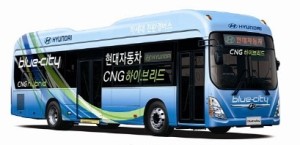
In 2010, the Seoul Metropolitan Government announced 100% CNG buses to operate in Seoul. The governmental mandate is intended to reduce pollution through 100% CNG buses .
South Korea began a focused program to replace diesel-powered transit buses with CNG-fueled buses in 2000. In 2006, 2,798 of Seoul’ s 7,766 registered city buses are CNG buses, and the rest are diesel-powered vehicles. By the end of 2011, it was revealed that the 7 local governments including the city of Seoul exceeded the natural gas-powered bus (CNG bus) deployment target of 100%.
The deployment rate exceeding 100% included the replacement units within the lifetime warranty period of 9~11 years for a natural gas-powered bus. According to the statistics on natural gas-powered vehicles gathered by the Ministry of Environment, the deployment of natural gas-powered bus is at 95% totaling 28,827 units from accumulated nationwide deployment of 30,359 (intra-city bus permit based) units.
The 7 local governments exceeding 100% deployment rates are Seoul (8,894 units, 103.4%), Busan (1,964 units, 101.0%), Daegu (1,744 units, 105.2%), Inchon (2,440 units, 104.2%), Gwangju (1,140 units, 112.6%), Daejun (1,055 units, 109.3%), Ulsan (745 units, 115.7%).
In 2012, the Ministry of Environment is deploying CNG-hybrid buses. The Ministry is planning to replace CNG buses that passed life expectancy with CNG-hybrid buses. This policy will be adjusted accordingly to the situation faced by each local government. As long as the replacement is made with CNG bus or CNG-hybrid bus, the outlived CNG buses can be replaced voluntarily. However, the Ministry will award extra points toward the procurement subsidy on natural gas-powered vehicle if the replacement is made with CNG-hybrid bus. This is to encourage the adaptation of CNG-hybrid bus.
The city government will require operators to replace the remaining diesel buses with new CNG models by 2010. Under Korean transportation law, bus operators are prevented from using a vehicle for more than nine years.
The city government will invest 96.8 billion won (US$101 million) in support of the program, and will provide bus operators with 22.7 million won (US$23,700) in subsides for every CNG bus purchased. A CNG bus in Seoul costs about 94 million won per unit (US$98,000) compared to 67.7 million won (US$70,700) for a diesel bus. Daewoo and Hyundai both manufacture CNG buses for the local market.
Motor vehicle are the largest source of air pollutants in large South Korean cities. Although heavy-duty diesel buses and trucks represent only 4% of the total vehicles, it is estimated that they emit 47% of the total vehicular emission amount.
Vehicular air pollution in the Seoul metropolitan area, which accounted for 55% of total air pollution in 1991, rose to 85% in 1999. Urban bus emissions are considered the primary source of air pollution in Korean cities.